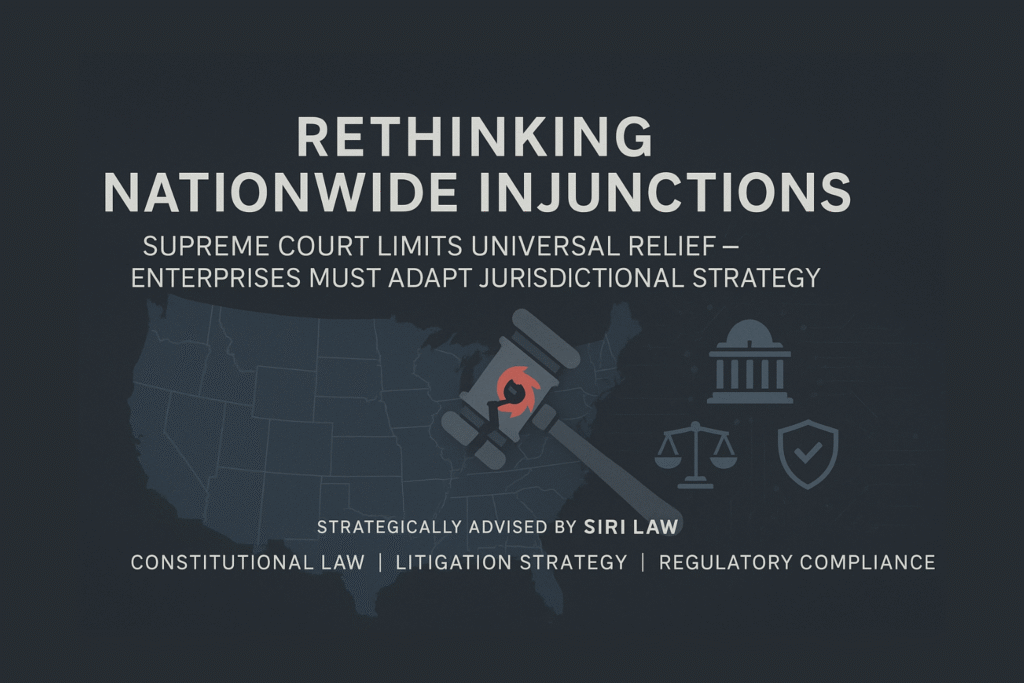
On July 8, 2025, the United States Supreme Court issued a seminal ruling clarifying the limited scope of district-court injunctions. In a case concerning an executive order on birthright citizenship, the Court held that lower courts must refrain from issuing “universal” injunctions that bar federal policies nationwide. This decision reshapes the landscape of judicial relief and compels businesses to adopt nuanced, jurisdiction-aware compliance strategies.
The Core Holding
A federal district judge had enjoined the executive order in its entirety, extending relief beyond the parties before the court and prohibiting enforcement across all jurisdictions. The Supreme Court reversed this expansive remedy, emphasizing that district courts should tailor injunctions to address specific litigants and localized interests. Nationwide stays, the Court concluded, risk upsetting the constitutional balance between the judiciary and the executive.
Implications for Corporate Compliance
- Jurisdiction-Specific Monitoring Injunctions will now more often apply only within a single district or circuit. Organizations must track legal developments in all jurisdictions where they operate rather than relying on one sweeping order.
- Adaptive Policy Frameworks Compliance manuals and standard operating procedures should be segmented by jurisdiction. Teams should maintain multiple playbooks reflecting differing injunction statuses and enforcement climates.
- Coordinated Multi-Venue Litigation To secure broader relief, entities may need to institute parallel challenges in several districts. Litigation strategies must consider forum selection, timing, and procedural harmonization.
- Enhanced Government Affairs Engagement With fewer opportunities for nationwide stays, advocacy efforts—legislative and regulatory—become increasingly vital. Organizations should collaborate with industry groups to shape policy before litigation becomes necessary.
Industries and Practice Areas in Focus
- Immigration and Mobility Services Legal teams advising on visas, citizenship, and migrant rights must prepare for regionally distinct injunctions on executive actions.
- Technology and Data Privacy Companies handling cross-border data transfers should anticipate fragmented judicial directives affecting specific user populations.
- Healthcare and Pharmaceuticals Providers and manufacturers must navigate localized injunctions on public health orders, drug approvals, and pricing mandates.
- Energy and Environmental Compliance Corporations in this sector should prepare for district-by-district enforcement of emissions standards and regulatory permits.
- Financial Services and Securities Regulation Banks, insurers, and asset managers must address consumer-protection and trading-rule injunctions that may vary by federal circuit.
Recommended Strategic Actions
- Establish a Jurisdictional Risk Matrix Develop a centralized dashboard cataloguing active injunctions, their geographic scope, and anticipated challenges.
- Segment Contractual Language Incorporate jurisdiction-specific compliance clauses and audit rights into new and existing agreements.
- Form Multi-District Legal Coalitions Coordinate filings across key forums, leveraging local counsel networks to expedite pleadings and argument schedules.
- Integrate Cross-Functional Teams Align legal, compliance, government affairs, and public relations to ensure consistent messaging and unified responses.
- Conduct Scenario Planning and Training Facilitate tabletop exercises simulating injunction scenarios to validate controls and decision-making processes.
Conclusion
The Supreme Court’s July 8 decision marks a critical inflection point in federalism and judicial practice. Enterprises can no longer depend on a single nationwide injunction to safeguard operations. Instead, they must pursue agile, geographically calibrated strategies that combine proactive litigation, dynamic compliance, and targeted advocacy to navigate an increasingly complex legal environment.
About SIRI Law
SIRI Law delivers comprehensive legal solutions designed for today’s fragmented regulatory landscape. We partner with corporate clients, public-sector entities, and non-profits to anticipate jurisdictional nuances and mitigate risk.
Our Services Include:
- Regulatory Compliance Audits and Frameworks
- Constitutional and Administrative Law Advisory
- Multi-Venue Litigation Coordination
- Data Privacy and Technology Governance
- Immigration and Mobility Law
- Public Policy and Government Affairs Support
Industries Served: Immigration, Technology, Healthcare, Energy, Environmental Services, Financial Services, and Public Sector.

